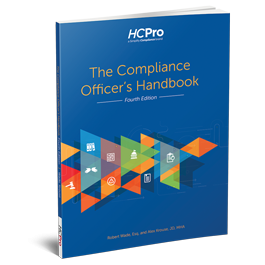The Compliance Officer's Handbook, Fourth Edition
Whether you are new to the field or a seasoned professional, The Compliance Officer’s Handbook, Fourth Edition, gives compliance officers everything they need to take charge of a healthcare compliance program. This book delivers tools, practical examples, and interpretations to build and maintain programs consistent with best practices for risk assessment, HIPAA compliance, training, monitoring, and auditing for compliance, and a host of other organizational responsibilities.
Packed with the latest examples from case law and federal enforcement actions, the fourth edition provides compliance officers critical insights and real-world examples of how regulations are currently applied in today’s healthcare landscape. Key topics such as the False Claims Act, Stark Law, determining fair market value, developing a revenue cycle compliance program and much more are broken down by two experts in the field.
Accompanied by a library of downloadable forms and tools that compliance officers can adapt and put to work right away for their organizations, this resource will also help readers:
- Understand the most current interpretations of key regulations
- Comply with regulatory agencies and how the courts expect regulations to be applied in the real world
- Comprehend how new and legacy regulations impact newer healthcare organization models such as Accountable Care Organizations (ACO)
- Identify key compliance risk areas, including physician compensation and revenue cycle management
- Create practical compliance monitoring and auditing processes
Click here to access chapter previews.
Published: May 2020
Pages: 182
Dimensions: 8.5" x 11" perfect bound
Print ISBN: 978-1-64535-030-9
Table of Contents
Chapter 1: History and Evolution of Compliance
Chapter 2: OIG Guidance for Compliance Programs
Chapter 3: Key Regulations for Compliance
Chapter 4: Privacy & Security - HIPAA
Chapter 5: Fair Market Value
Chapter 6: Internal Strategies for Best Practices
Chapter 7: The Risk Assessment
Chapter 8: Training Strategies
Chapter 9: Monitoring and Auditing
Chapter 10: Effective Internal Investigations
About the Authors
Robert A. Wade, Esq., is a partner in the law firm of Barnes & Thornburg LLP. He concentrates his practice in representing healthcare clients, including large health systems, hospitals, ambulatory surgical centers, physician groups, physicians, and other medical providers. Wade’s expertise includes representing clients with respect to the Stark Act, Anti-Kickback Statute, False Claims Act, and Emergency Medical Treatment and Active Labor Act of 1986.
Alex Krouse, JD, MHA, is an attorney with extensive experience in health care operations specific to provider alignment initiatives. He provides advice to health systems on new health care initiatives, effective utilization of healthcare professionals, and strategic provider alignment. This includes addressing significant business and legal issues ranging from the Stark Law to Medicare reimbursement regulations. In addition to his experience in health care operations and strategy, Mr. Krouse is a national thought leader in provider compensation strategy including fair market value. He serves on multiple national committees focused on provider compensation and writes and speaks extensively on fraud and abuse issues and emerging regulatory issues. Prior to practicing law, Krouse gained experience in hospital operations both in a large health system and a community hospital.





 If for any reason you are not completely satisfied with an HCPro product, simply return it within 30 days of purchase and we will issue you a full refund.*
If for any reason you are not completely satisfied with an HCPro product, simply return it within 30 days of purchase and we will issue you a full refund.*